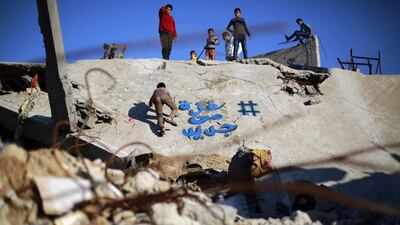The ceasefire terms that ended the Gaza war in August, and developments since, mirror previous conflicts between Israel and Hamas. As such, it is no surprise that the ceasefire is unravelling, just as its predecessors did.
Gaza has been back in the headlines since December 20, when the media reported Israeli bombing “in response” to a rocket fired by militants. Four days later, fighting killed a Hamas member and wounded an Israeli soldier.
What has gone unreported is that, according to the UN Office for the Coordination of Humanitarian Affairs, Israel has been firing at Palestinian civilians in Gaza “by land and at sea” on a “daily basis” since November. Palestinian civilians have been killed and injured, yet Israel insists it is abiding by the ceasefire.
It is not just Israeli military provocation that is ensuring a return to war. Fundamental aspects of the ceasefire agreement have not been fulfilled. More than four months on, further talks have not taken place.
Nor has the administration of Gaza’s borders and reconstruction by the Palestinian Authority (PA) due to continued bickering with Hamas. A major bone of contention is non-payment by the PA of some 42,000 Hamas employees in Gaza, amid reports of Israeli vetoes.
Egypt agreed to open the Rafah crossing, Gaza’s only other outlet to the world. However, more often than not the crossing has been shut, including the longest continuous closure since 2008. In addition to Egypt’s expansion of its buffer zone with Gaza and the intensified crackdown on smuggling tunnels, the territory is more isolated than ever.
The ceasefire agreement fails to mention an end to the blockade of Gaza, or the wider fundamental issue of Palestinian statehood – as if a ceasefire alone is a viable solution.
The international community is contributing to the next war by woefully failing the people of Gaza. More than two months after donors pledged $5.4 billion to help rebuild the territory, barely two per cent of the money has been transferred. Furthermore, despite an agreement between the PA, Israel and the UN to allow building materials into Gaza, Oxfam says the pace of reconstruction is so slow that development “could take more than 50 years”.
An investigation by The Guardian found that the “controversial UN-designed mechanism to control the supply of building materials ... has been widely corrupted”. A spokesman for Hamas’s armed wing warned this month of a “new explosion” with Israel unless reconstruction was sped up.
Certain statistics highlight the scale of Gaza’s problems: the homes of 600,000 Palestinians were destroyed or damaged by Israel last summer, many people still lack access to piped water, electricity is limited to a few hours a day, almost half of Gazans are unemployed, and 70 per cent of families receive humanitarian aid. To make matters worse, severe flooding last month led the UN to declare a state of emergency.
Despite the jubilation that followed the last ceasefire, in some respects nothing has changed and in other respects the plight of Gaza has greatly worsened. It is an untenable situation. A resumption of all-out conflict seems only a matter of time. In their actions and statements, both Israel and Hamas are preparing for this eventuality.
While Israel has stepped up its attacks, Hamas this month held what Reuters described as “its biggest show of force since the end of the Gaza war this summer”, to mark its 27th anniversary. As is usual in the run up to Israeli elections, anti-Palestinian rhetoric and provocations are on the rise in an effort to win votes.
Israel may be banking on Palestinian factional divisions and Hamas’s regional isolation. Neighbouring Egypt has been hostile toward the movement since Mohammed Morsi was ousted. Hamas also lost the backing of Damascus, Hizbollah and Iran after expressing support for the Syrian revolution.
It has strained relations with certain Arab Gulf states, and there have been recent reports that Qatar may suspend support for Hamas as part of a rapprochement with Egypt. Israel may be hoping that Hamas lacks the means to withstand another major conflict.
Hamas, in turn, may be banking on its heightened domestic popularity since the last invasion (this has occurred with every previous Israeli military onslaught), as well as Israel’s increasing international isolation, which another war on Gaza would deepen.
Hamas and Iranian officials have spoken of a recent resumption in military and financial support (Hamas officials visited Tehran earlier this month). Hizbollah’s tone has also been more conciliatory since the last Gaza onslaught, and Hamas enjoys close ties with regional powerhouse Turkey.
The stage has been set for the next conflict since the end of the last one. The predictability with which this is happening means the international community cannot claim ignorance. By shirking its responsibility towards the Palestinians, it is compounding culpability for their plight. That dreadful clock is ticking once again.
Sharif Nashashibi is a journalist and analyst on Arab affairs

